Easements in Texas provide individuals or entities like utility companies with the right to use or access a person’s property for a particular purpose. It’s important for a property owner to read and understand who has easement rights to their land and what precisely those rights include when buying a parcel of land. If you have a Texas easement dispute, your best course of action is contacting an experienced easement attorney today.
How wide is an easement when a deed doesn’t specify the width? A recent decision from the Texarkana Court of Appeals, in the case of Southwestern Electric Power Company v. Lynch, Batchelor and Wilson, is a good reminder of the problems that can arise when a deed does not include certain information, such as the precise boundaries of a property easement.

There’s Wide, and Then There’s WIDE
The appellees in the case, Kenneth Lynch, Tommy Batchelor and Twant Wilson, all own property in Bowie County, Texas, that is encumbered by utility easements in favor of the Southwestern Electric Power Company (SWEPCO). These easements were granted to SWEPCO in 1949 while the land was still in the hands of the previous owners.
The problem is, the language in the easement documents does not specify the width of the easement. Historically, the easement has been considered to be thirty feet across (fifteen feet on each side of the power line).
In 2014, SWEPCO tried to have landowners agree to have the easement officially set to be 100’ across. The four landowners refused to sign the agreement; SWEPCO entered their land anyway, citing the 1949 agreement.
Lynch and the others filed a declaratory judgment suit against SWEPCO, asking the trial court to declare that the company’s prior use of certain utility easements across their respective tracts of land limited the width of its easement to thirty feet. They felt that the general easements granted to SWEPCO denied them the full use of their land. SWEPCO argued that the 1949 deeds granted a general easement that was not so limited in width.
The trial court found in the property owner’s favor, declaring that SWEPCO’s prior use of the easement across their properties limited its present and future use to a width of thirty feet. The court also awarded the land owners’ attorney fees and costs.
The Appeals Court Decision
SWEPCO appealed the decision, contending that the trial court erred when it denied SWEPCO’s plea to the jurisdiction, interpreted the deeds using extrinsic evidence, and awarded attorney fees and costs.
The appellate court sided with the landowners in this case, affirming the trial judge’s decision.
Answers to Questions About Your Texas Easement Dispute
Texas is growing quickly, especially in the oil and gas sector, and the number of easement cases is growing with it. If an entity approaches with an easement or eminent domain claim, you’ll want to make sure they have the power of eminent domain. Next, you’ll want to take steps to limit the impact of the the pipeline on your property. Also, you’ll need to ask some very detailed questions about the long term use and value of your land.
Read More
The government, under the Texas Landowner’s Bill of Rights, must provide fair compensation for any land taken for public use. This means that if you were compensated for a portion of your property under an easement agreement, but other portions of your land were either damaged or taken as a result, you may be eligible to file an inverse condemnation suit.
Read More
Stopping an entity from seizing land under eminent domain laws is difficult, but it can be done if you can prove the entity has not met all the necessary requirement under the law. The main requirements are that:
• The condemning entity has the legal authority to seize your land.
• The acquisition must be for public use.
• The landowner must receive just compensation.
Read More
Easement Rights Dispute in Texas
This case shows how old general and blanket easement rights, some granted decades ago, can cause problems for landowners. The best way to avoid any confusion is to seek legal assistance from an experienced Texas land rights attorney when negotiating any sort of easement or other property agreement. A general easement doesn’t necessarily mean the entity with easement rights has unlimited access to your property.
If you are involved in a dispute involving an easement on your land in Texas, the Texas property right dispute lawyers at Dawson & Sodd are here to help. We’ve been protecting the property rights of landowners in Texas for over a hundred years, and we work with landowners all across the state.






